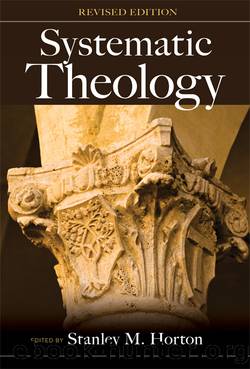Systematic Theology by Stanley M. Horton

Author:Stanley M. Horton
Language: eng
Format: epub
Tags: Systematic Theology
ISBN: 9781607311225
Publisher: Gospel Publishing House
Published: 2013-01-21T16:00:00+00:00
ADOPTION
God does more, however, than give us right standing with himself. He also brings us into a new relationship; He adopts us into His family. A legal term, “adoption” is that act of sovereign grace by which God gives all the rights, privileges, and obligations of being in His family to those who receive Jesus Christ. Although the term does not appear in the Old Testament, the idea does (Prov. 17:2). The Greek word huiothesia, “adoption,” appears five times in the New Testament, only in Paul’s writings, and always with a religious sense. In becoming the children of God we do not, of course, become divine. Deity belongs only to the one true God.92
The New Testament teaching on adoption takes us from eternity past, through the present, and to eternity future (if such an expression is appropriate). Paul says that God “chose us in him [Christ] before the creation of the world” and “predestined us to be adopted as his sons through Jesus Christ” (Eph. 1:4–5). He says about our present experience, “You did not receive a spirit that makes you a slave again to fear, but you received the Spirit93 of sonship [huiothesia].94 And by him we cry [in our own language], ‘Abba [Aramaic, Father], Father’ [Gk. ho patēr]” (Rom. 8:15). We are fully sons though not yet fully mature. Then, in the future, when we lay aside mortality, we will receive “our adoption as sons, the redemption of our bodies” (Rom. 8:23). Adoption is a present reality, but it will be fully realized in the resurrection from the dead.95 God gives us these family privileges through the redeeming work of His unique Son, the One who is not ashamed to call us brothers (Heb. 2:11).
PERSEVERANCE
If the doctrine of election raises the ire of nonbelievers, among believers the doctrine of perseverance does the same. The caricatures that the proponents of the differing views give of every other view most often have no basis in reality. Some among the Wesleyan-Arminian persuasion insist that Calvinists believe once they are saved they can do whatever sinful thing they please, as often as they please, and still be saved—as if they believe the sanctifying work of the Spirit and the Word does not affect them. Whereas some Calvinists might insist that Wesleyan-Arminians believe any sin they commit jeopardizes their salvation, so that they “fall in and out of” being saved each time they sin—as if they believe that God’s love, patience, and grace are so fragile that they shatter at the slightest pressure. Any person who is biblically and theologically alert recognizes the lie in both of these caricatures. The presence of extremes has led to unfortunate generalizations.96
Of course, we must understand that impossibility of accepting as equally true both the Calvinist and Wesleyan-Arminian positions. Either the Bible gives the assurance to a truly saved person that no matter how far at times the believer may depart from living out biblical Christianity he or she cannot and will not ultimately depart from the faith, or it does not.
Download
This site does not store any files on its server. We only index and link to content provided by other sites. Please contact the content providers to delete copyright contents if any and email us, we'll remove relevant links or contents immediately.
Fearfully and Wonderfully Made by Philip Yancey & Paul Brand(592)
Christian Ethics by Wilkens Steve;(582)
Numbers by Ronald B. Allen(509)
The World from 1450 To 1700 by Wills John E.;(506)
Christian Ethics: An Introduction to Biblical Moral Reasoning by Wayne Grudem(485)
How to Read Slowly by James W. Sire(475)
God and the Multiverse by Victor J. Stenger(455)
Morality by Jonathan Sacks(439)
Monastic Archaeology by Unknown(411)
The Disabled Church by Rebecca F. Spurrier;(402)
Jesus: A New Vision by Whitley Strieber(380)
Critical Writings by Joyce James;(375)
Death of the Doctor by Unknown(373)
Amish Grace by Donald B. Kraybill & Nolt Steven M. & Weaver-Zercher David L(371)
Redeeming Sociology by Vern S. Poythress(370)
The Technological System by Jacques Ellul(361)
Children of Lucifer; The Origins of Modern Religious Satanism by Ruben van Luijk(357)
The Catholic Case for Trump by Austin Ruse(339)
The Church in the Early Middle Ages by G.R. Evans(339)
